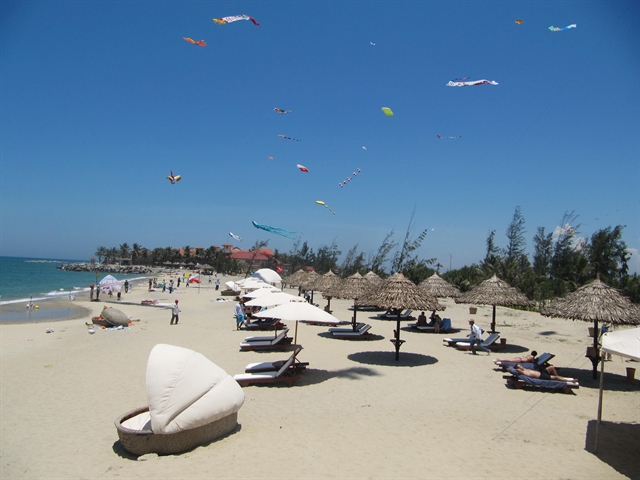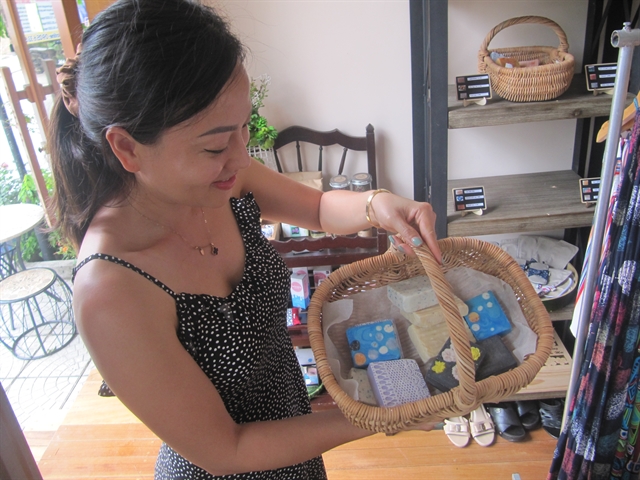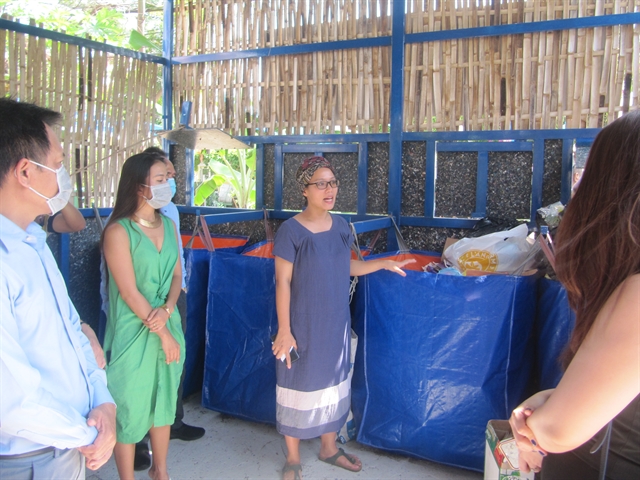Sustainable

Fishing village turns ‘green’ to boost tourism
by Hoàng Vy

Tân Thành fishing village, on An Bàng beach, 5km from Hội An, has been building ‘green’ beach tourism by boosting plastic-free and zero-waste recycling among the community and tourists.
A group of 13 travel businesses and local fishermen decorated a 300m section of coastal Nguyễn Phan Vinh Street, creating a vibrant art space and entertainment area.
The community set up the Tân Thành weekend flea market as an artisanal and organic production rendezvous for all local and expat vendors, helping create day and night beach activities.
The beach-front market was flooded with handicrafts, food & beverage, organic farm produce, costumes and folk dance performance from morning till late evening.
Streets are turned into stages for bands, dancers and mini-fashion shows for local and expats, while various products from organic cuisine, recycled items, old furniture and second-hand belongings are displayed on stalls.

Each household in the street hosts unique experiences for free among visitors.
“There are 15 galleries and outdoor showrooms depicting fishing culture, gardens, meditation, libraries, yoga and offering night stays. The flea market is a key focus for tourists sharing the 100-year lifestyle of the fishing village,” said head of the business group, Lê Quốc Việt.
“Fishermen revive the lifestyle by doing night fishing, folk performances, camp fires and fresh seafood. The community also offers 200 rooms for week-long events,” he said.
Việt said the first waste recycling site – the Material Recovery Facility – was built to collect waste for recycling rather than dumping it.
Restaurant and coffee shop owners were trained in garden waste recycling and processing waste into compost and detergent, he added.
Phạm Thị Hải Nguyên, a resort manager at Tân Thành village, said the weekend market was born in response to overcrowding in the Old Quarter of Hội An and promoting ‘Zero plastic waste tourism’.

Nguyên said the market promoted artisanal and organic products to enhance the unique brand among dozens of destinations and fairs in Hội An.
At least 80 vendors flocked to the market to sell farm produce, healthy foods and drinks, paintings, old furniture and antiquities, she said.
Lương Thúy Hà, a member of the market managing board, said the market had lured not only tourists, but also local vendors and farmers from suburban areas of Hội An.
“The market helped local residents expand linkages with other farms and craftsmen from Đà Nẵng, Huế and Quảng Nam,” Hà explained.
The Chairman of Quảng Nam tourism association, Phan Xuân Thanh, suggested the community should develop it as the One-Commune, One Product (OCOP) – an eco-tour brand – that could help promote sustainable and ancient culture preservation.
“Tân Thành community should be the first ‘green’ tourism brand and ‘circular economy’ sample of sustainable tourism strategy of Quảng Nam’s tourism industry,” Thanh said.
“Local residents began recycling waste into valuable and profitable products. Waste classification at source and recycling will be a basis for the ‘green’ and non-plastic tourism brand of Hội An,” he said.
Thanh added the community could promote it as an environmental-friendly destination – where tourists earn experience in waste recycling or exchanging recyclable waste for goods.
The community encourages people from other areas of Hội An to bring recyclable and reusable waste to the Material Recovery Facility for better treatment rather than dumping it at overloaded landfills.
Fishing experience

Since the weekend market was opened, fisherman Lê Văn Hùng, 52, began hosting night fishing on bamboo coracles for tourists after working at a restaurant in Tân Thành.
“I have retired from month-long sea trips due to my age, but still retained my fishing skills by hosting night fishing and fishing experiences. Inshore fishing trips on small bamboo boats and fish net weaving will be interesting for tourists,” Hùng said.
“My father, 87, an old fisherman, also takes part in folk performances at the weekend market, while my daughter opened a cafe and shop at home,” he said.
Lê Thị Hồng Vân, 23, said the weekend market had become a popular rendezvous for not only fishing culture, but also waste recycling and non-plastic use among the community and vendors from other localities.
She said tourism in Hội An – a UNESCO world heritage site – was noted as a well-known spot for international and domestic travellers, but coastal and rural communities surrounding Hội An had been turning to ‘green’ tourism.
Nguyễn Thị Nhị Hà, who owns a farm and homestay, said organic farm produce from gardens in the community were used for daily meals and sale at the outdoor market.

She said the community featured a showcase of organic agriculture and healthy living by offering free entrance for all to ‘green’ gardens at many homestays and hotels.
Hội An opened a battery-powered car route to help visitors travelling from the Old Quarter to Tân Thành – the last stop of the farming zone experience in Trà Quế and Cẩm Châu villages – to combine rural and beach tour programmes in Hội An.
Tân Thành is linked to An Bàng beach – the most popular site among foreigners. It is emerging as a new fun zone for day and night entertainment near Hội An’s Old Quarter.
Nguyên, who is the founder of the weekend market, said the Tân Thành community had made a name for itself on the tour map of Hội An, so zero waste-recycling and non-plastic would be a key trend of the eco-tour and ‘green’ tourism brand in Hội An. VNS
What the media says about us
🎈Sea’lavie Press
https://bvhttdl.gov.vn/quang-nam-them-mot-buoc-den-du-lich-xanh-20220104162637868.htm
Just a few minutes away from Tan Thanh Beach, Sea’lavie Boutique Resort and Spa is an ideal choice for your green Hoi An holiday. This charming boutique resort is just one of Quang Nam’s many sustainable businesses who are striving to protect the local environment and provide for its people. See more: https://bit.ly/quangnam_greentravel 🌱
#visitquangnam
https://www.visitquangnam.com/vi/trai-nghiem/cac-bai-bien/khu-nghi-duong-bien-hoi-an/
Điểm Mặt Danh Sách 5 Resort 4 Sao Hội An | Giá Hời, View Đẹp
Sea’lavie Hội An: Dinh thự nghỉ dưỡng nên thơ ngay bãi biển An Bàng
Quảng Nam: Doanh nghiệp du lịch xanh tiên phong
https://www.sgtiepthi.vn/du-lich-xanh-con-duong-kho-nhung-phai-di/
Sea’lavie
https://hoian.quangnam.gov.vn/webcenter/portal/hoian/pages_tin-tuc/chi-tiet?dDocName=PORTAL465319
https://thesaigontimes.vn/uoc-mo-mot-lang-du-lich-cong-dong-khong-rac-thai/
https://reviewvilla.vn/bien-an-bang/
https://fidm.edu/en/majors/fashion+design/experience/latest+news/Grad+and+Entrepreneur+Jenny+Pham+Designed+Her+SeaLavie+Resort+and+Spa+Located+in+Vietnam
